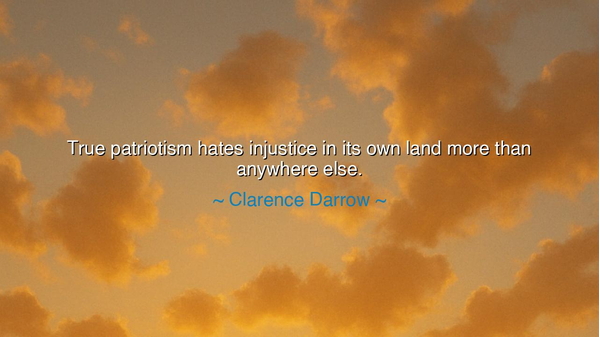
True patriotism hates injustice in its own land more than






Clarence Darrow, the fiery lawyer and defender of the downtrodden, once gave the world a truth that burns like a beacon in the fog of false loyalty: “True patriotism hates injustice in its own land more than anywhere else.” In these words, he cut through the hollow cries of those who boast of love for country while turning a blind eye to its sins. For Darrow reminds us that genuine patriotism is not flattery, not blind obedience, not the worship of flags and anthems—it is the courageous devotion to cleanse one’s homeland of injustice, even when it is painful to do so.
The origin of this thought lies in Darrow’s life as an attorney who often stood against the powerful in defense of the powerless. He believed that loyalty to a nation was meaningless if it demanded silence in the face of cruelty. To him, it was hypocrisy to condemn injustice abroad while excusing it at home. Thus he declared that the truest lover of country is the one who dares to expose its faults, for only by facing its own corruption can a nation hope to be just and strong.
History bears witness to the truth of his words. In America’s civil rights struggle, countless citizens marched against segregation and discrimination, not because they hated their country, but because they loved it enough to demand better. Martin Luther King Jr. proclaimed that America must live up to the “sacred obligation” written in its founding documents. His patriotism was fierce, not because he ignored injustice, but because he hated it most of all within his own land. His dissent was not betrayal but faith, the kind of faith that believed his nation could rise to its highest ideals.
Consider also Abraham Lincoln, who faced a nation torn by slavery and civil war. He did not justify injustice by pointing to the sins of other lands. Instead, he declared slavery a moral evil that must be ended on American soil. His patriotism was rooted not in denial but in confrontation, for he knew that a nation cannot call itself free while denying freedom to millions. In hating the injustice of his own land, Lincoln proved his love of country by striving to redeem it.
Darrow’s wisdom warns us of the false patriot, who points to the sins of other nations to excuse the sins of his own. Such a man says, “Look at their cruelty, look at their corruption,” while ignoring the injustice that festers at home. But this is no patriotism—it is cowardice wrapped in national pride. True patriotism does not fear self-criticism, for only by admitting fault can a nation be healed. The patriot who dares to condemn his own country’s wrongs is not its enemy but its physician, willing to lance the wound so that life may be preserved.
The lesson for us is both demanding and clear: if you love your country, you must be willing to confront its failings. Do not let pride blind you, nor let comfort still your tongue. Speak when others are silent, and stand when others bow. For nations, like men, are redeemed not by denial of guilt but by repentance and change. To hate injustice in your homeland is to show the highest loyalty, for you demand that your land live not in hypocrisy but in truth.
Therefore, let this teaching be handed down: do not mistake flattery for love, nor silence for loyalty. True patriotism is fierce and unafraid, for it would rather wound the nation with truth than destroy it with lies. When you see injustice in your homeland—whether in law, in labor, or in the treatment of your fellow citizens—oppose it with courage. In doing so, you honor your country more deeply than those who praise it while it rots.
So let Clarence Darrow’s words burn in our memory: “True patriotism hates injustice in its own land more than anywhere else.” Let them call us to vigilance, to honesty, to courage. And let them remind us that the purest love is not that which flatters, but that which fights—fights to make the beloved worthy of its highest ideals.






AAdministratorAdministrator
Welcome, honored guests. Please leave a comment, we will respond soon